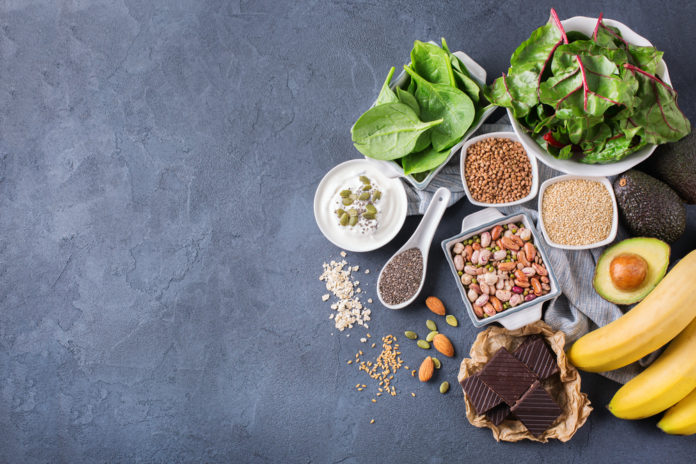What Nutrients Provide Energy?
In the context of nutrition, energy is supplied in the form of calories. Calories are sourced from the three macronutrients – carbohydrate, protein, and fat:
Carbohydrates
Casually known as carbs, carbohydrates provide 4 calories per gram and are readily used as energy. When carbohydrate foods are consumed, the body breaks it down to glucose and uses it as fuel.
Glucose can also be stocked as glycogen, which is the storage form of glucose the body warehouses in the liver and muscles. In times of need, glycogen is quickly mobilized to deliver fuel the body depends on.
But rather than consuming simple sugars in the form of refined and added sugar, that cause a quick spike and drop, it is recommended to consume high-fiber and complex carbs that burn much slower in the system and sustain fuel for much longer.
Ultimately, choosing nutritious carbs is key for sustaining energy levels and overall health, as too many refined sources can fluctuate blood sugar, energy, and mood, along with increasing the risk of weight gain and chronic diseases.
Recommended Food Sources:
Whole grains, fruits, veggies, milk and dairy products, beans and legumes, nuts and seeds
Protein
Like carbohydrate, protein provides 4 calories per gram. While the body does not directly use protein for energy, the macronutrient is essential for muscle synthesis to support and grow muscle mass, thus boosting a healthy metabolism.
According to data published in the Current Opinion of in Clinical Nutrition and Metabolic Care, protein has shown to be more satiating than carbohydrate and fat in the short and long-term to help keep appetite and energy levels at bay.
Recommended Food Sources:
Beef sirloin, eggs, chicken, tuna, Greek yogurt, cottage cheese, edamame, tempeh, beans, lentils, quinoa, nuts and seeds
Fat
Unlike carb and protein, fat provides 9 calories per gram. But like consuming adequate intake of protein and carbohydrates, your body requires fat to maintain a steady metabolism.
Fat is one of the body’s best transporters and responsible for shuttling several nutrients throughout the body. These carriers are critical for carrying out a number of chemical reactions that help regulate growth, immune function, reproduction, and other components required for metabolic processes.
And while fat is the most calorically-dense, its intake lends high satiety much like protein to keep energy stable throughout the day.
It is important, though, to recognize dietary fat does come in various forms and including more unsaturated fats is recommended. Unsaturated fats are further broken down into mono- and polyunsaturated fatty acids, which bare antioxidant properties and proven to protect heart and overall health.
Recommended Food Sources:
Fatty fish (such as tuna, mackerel, and salmon), eggs, avocados, olive oil, grassfed beef, nuts and seeds, soybeans, and dark chocolate
Vitamins for an Energy Boost
“Vitamins don’t supply calories!” you may refute. But before battling too hard, let us introduce the B vitamins…
Also known as vitamin B complex, these vitamins are involved in critical physiological processes that support a healthy metabolism. So while B vitamins do not provide energy the way macronutrients do, their intake allows the body to best utilize energy and serves other valuable functions.
Vitamin B1 (Thiamin)
Thiamin is involved in the metabolism of carbohydrates, branched-chain amino acids, and fatty acids and plays a role in nerve function.
Recommended Intake:
1.2 milligrams (mg) per day for males and 1.1 mg for females
Food Sources:
Whole grain cereals, legumes, nuts and seeds, yeast, and pork
Vitamin B2 (Riboflavin)
Riboflavin is involved with energy production and functions as an antioxidant to protect the body’s cells against damage. Riboflavin also upkeeps both eye and skin health.
Recommended Intake:
1.3 mg per day for males and 1.1 mg per day for females
Food Sources:
Milk, yogurt, yeast, whole grain breads and cereals, organ meats such as liver, and egg whites
Vitamin B3 (Niacin)
Niacin is essential for not only processing the macronutrients, but for metabolizing alcohol out of the body. The B vitamin also maintains skin, nervous, and digestive health.
Recommended Intake:
16 mg per day for males and 14 mg per day for females
Food Sources:
Fortified and enriched pastas and cereals, coffee, tuna, anchovies, shiitake mushrooms, and barley
Vitamin B5 (Pantothenic Acid)
Pantothenic acid supports cellular energy production, participates in multiple life-sustaining processes, and is essential to all forms of life.
Recommended Intake:
5 mg per day for both males and females
Food Sources:
Naturally sourced from a wide variety of animal and plant sources, including organ meats, fish, milk, sweet potatoes, eggs, legumes, mushrooms, yogurt, sunflower seeds, and oranges
Vitamin B6 (Pyridoxine)
Also known as pyridoxine, vitamin B6 is involved in over 100 essential chemical reactions in the body. Vitamin B6 is required to metabolize amino acids and glycogen, synthesize hemoglobin, and facilitate functions of estrogen and testosterone.
Recommended Intake:
1.3 mg per day for males and females
Food Sources:
Fortified breakfast cereal, tuna, salmon, chicken, bananas, russet potato with skin, avocado, chickpeas, and bulgur
Vitamin B7 (Biotin)
Vitamin B7 is involved in several processes, including the metabolism of protein, carb, and fat. It may also support healthy skin, hair, and nails if deficient in biotin.
Recommended Intake:
30 micrograms (mcg) per day for both males and females
Food Sources:
Yeast, cheese, cauliflower, pork, raspberries, liver, mushrooms, peanuts, almonds, nonfat milk and yogurt, meat, soy protein, and egg yolks
Vitamin B9 (Folate/Folic Acid)
Folate and folic acid are often used interchangeably, though folate occurs naturally in foods while folic acid is the synthetic form found in fortified foods and supplements.
Folic acid is mostly known for supporting fetal health and development, particularly as it is critical for the metabolism of nucleic acids (DNA and RNA), to prevent neural tube defects. The B vitamin is also required for the synthesis of and amino acids.
Recommended Intake:
400 mcg per day for males and females
Food Sources:
Green leafy vegetables such as spinach, lentils, spaghetti, lima and garbanzo beans
Vitamin B12 (Cobalamin)
Vitamin B12 plays a role in cellular energy production, along with regulating DNA and RNA and developing red blood cells.
Recommended Intake:
2.4 mcg per day for males and females, with greater needs during pregnancy and if lactating
Food Sources:
Present in virtually all animal products, including such as meat, poultry, fish and shellfish, with lesser amounts in dairy products and eggs
All recommended intakes, unless otherwise noted, represent healthy adults ages 19 to 50 and are based on daily recommended dietary allowances (RDAs) or adequate intakes (AIs)
Finding Your Balance
Though the energy-providing macronutrients and B vitamins guarantee lasting vitality, the additional vitamins and minerals should not go unnoticed.
In fact, all vitamins and minerals are essential in keeping the body strong and health. Luckily, they can all be inherited by balancing your diet with a variety of nutrient-dense foods, including whole grains, fruits and veggies, milk and dairy products, lean and plant-based proteins, nuts and seeds, and vegetable oils.
If desiring assistance to find your balance, look no further than Balance by bistroMD! Balance is an a la cart meal delivery service providing fresh meals straight to doorsteps.
Each meal is scientifically balanced with complex carbohydrates, whole grains and fiber along with lean protein and healthy fat ratios. And with breakfast, lunch, dinner, and snack options, you can keep energized throughout the entire day!
Also offering selections such as apple cinnamon oatmeal with scrambled eggs, chicken meatball marinara, Jamaican style black pepper shrimp, a raspberry chipotle vegetable bowl (must we go on…?), there is always an option to excite your taste buds!
For more information on Balance by bistroMD, visit the official page here or call 844-411-2252 today!









